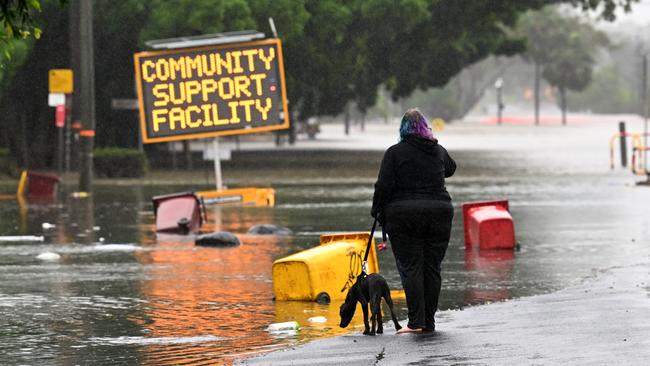
One day it will dry out and we can look forward to a return of rising temperatures, bone-dry overgrown pastures left over from the time of plenty and the blazing roar of forest fire. If only we could turn the tide. Of all the weapons picked up in the fight against climate change, catastrophisation of the weather has been the most potent. Sad polar bears tug the heart strings but bushfires and floods make it personal.
Science still can’t attribute any single weather event to climate change but the latest Intergovernmental Panel on Climate Change report says human-induced climate change is already affecting many weather and climate extremes in every region across the globe.
The executive summary of the IPCC’s Sixth Assessment Report into the physical science published last year says evidence of observed changes in extremes has strengthened. It says human influence has likely increased the chance of compound extreme events since the 1950s. “This includes increases in the frequency of concurrent heatwaves and droughts on the global scale (high confidence), fire weather in some regions of all inhabited continents (medium confidence) and compound flooding in some locations (medium confidence),” it says.
Despite the IPCC caveats, the dominant narrative has become one of natural retribution from nature for the sins of humankind.
Against this background, there is little doubt that memories of the 2019 bushfires and recent severe flooding on the east coast had an impact on how some people voted in the federal election. A demand for action on climate change can help to explain the strong showing of the Greens and teal independents while the issue has broad support across all parties.
With the election count in, Labor has the responsibility to introduce its climate policies. They are more ambitious than the Coalition’s but do not match the expectations of the teals or Greens. Labor’s plans still represent a herculean task full of risk.
Beyond the politics, climate combatants must consider the psychological damage being done by using the weather to undermine confidence and engender fear in the natural world. Climate “doomism” is a new phenomena in which a generation of young people thinks there is no hope and nothing to live for.
A global survey of 10,000 young people aged 16 to 25, including in Australia, Brazil, Finland, France, India, Nigeria, The Philippines, Portugal, Britain and the US, has zeroed in on climate anxiety. The results, published in The Lancet Planetary Health, found 84 per cent of participants across all countries were worried about climate change, with 59 per cent very or extremely worried.
More than half reported being sad, anxious, angry, powerless, helpless and guilty. More than 45 per cent of respondents said their feelings about climate change negatively affected their daily life and functioning, three-quarters were fearful about the future and 83 per cent said they thought people had failed to take care of the planet. Climate anxiety and distress were correlated with perceived inadequate government response and associated feelings of betrayal.
Across the board, fears are increasing for personal safety because of climate change. A global study by the Pew Foundation completed last year found that in Australia the number of people who were very concerned that climate change would harm them personally at some point in their lifetime increased from 18 to 34 per cent between 2015 and 2021. This level was slightly below Germany and Britain but higher than South Korea, Spain, Canada and France. In Japan concern fell by 8 per cent from 34 to 26 per cent. Young people were more concerned.
While many worried that climate change would harm them personally in the future, there was widespread sentiment that climate change was already affecting the world around them. Respondents who placed themselves on the left of the ideological spectrum were more likely than those who placed themselves on the right to be concerned that global climate change would harm them personally during their lifetime. In Germany, women were 13 points more likely than men to be concerned that climate change would cause them harm. Double-digit differences were also present in the US, Sweden, Britain, South Korea, Singapore, Taiwan, Australia and The Netherlands.
Caring for the planet will always be a good thing. But teaching a generation of people to be fearful of the natural world is the opposite of what is required. At worst, it can lead to diabolical outcomes for nature in the name of saving the planet.
Changing the tune that nothing is being done in Australia about climate change is overdue. But whatever is done, the fact will remain that any attempts to change the weather in the land of drought and flooding rains will always be doomed to failure.



There’s bad news on the weather front. Despite the election result the rain bombs will continue. The latest forecast suggests we even may get another wet La Nina year, an unusual but not unprecedented triple event.